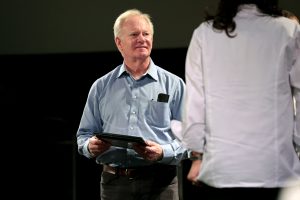
Chuck Coughlin at Arizona Talks at Greenwood Brewing in Phoenix, March 1, 2022. (Photo: Gage Skidmore)
Consultant Class Makes Bank on Ranked Choice Proposal
Chuck Coughlin leads Make Elections Fair to 8 digits
By Ken Kurson, February 19, 2024 5:21 am
There’s a ranked-choice voting scheme afoot in Arizona. And that means someone’s getting rich.
The job of political consultant becomes easier and more lucrative when voters are angry. So keeping them angry serves the financial interest of the consultant class, and the ones who are good at it don’t have to worry about their next meal.
Chuck Coughlin is pretty good at it.
Coughlin is the long-time consultant to Republicans including former governors Jan Brewer and Fife Symington, former Attorney General Grant Woods and former Congressman Matt Salmon. Since the Fall, he’s been running operations for Make Elections Fair Arizona, which is seeking to place an initiative on the ballot that would establish open primaries and ranked-choice voting, and open presidential primaries to all voters, including those who don’t belong to the party of the candidates they’re considering.
Coughlin took pains to point out to the Arizona Globe the distinctions between his group’s proposal and a pure ranked-choice system. For one thing, the ranked choice doesn’t kick in until there are “more than three” candidates. Just as importantly, this is a proposal aimed only at primaries, not the general election. Coughlin told the Globe, “We are an open primary initiative. We are agnostic on the GE.”
The group, which is helmed by several well-known political figures including former Phoenix mayor Paul Johnson, scored a major success in December, when a competing initiative called Better Ballot Arizona petered out. That allowed the Make Elections Fair group a clear shot at undoing the state’s current partisan voting system.

Which isn’t easy. Collecting sufficient signatures to get on the ballot is logistically difficult – and expensive — and educating voters about why they should support an initiative is also expensive. Consultants love expensive.
Coughlin told the Arizona Globe, “We pay $28 per hour and we need 385K valid signatures.” That pencils out to something like $19 per signature but of course the group is aiming to do more than simply get on the ballot — they want to win.
The Arizona Globe has gotten its hands on a memo sent by Make Elections Fair that goes into more detail on the financial goals of the group. Make Elections Fair is trying to raise $14 million, including a budget of $7.5 million for signatures and $6.5 million for voter education. They set a goal of 500,000 signatures against the required 385,000, since there will inevitably be duplicates and invalid signatures so a margin above the bare minimum is prudent.
That hasn’t kept Arizona Republicans from griping about the initiative and about Coughlin personally.
“He [Coughlin] is a reliable never-Trump voice when the mainstream media requires a Republican to criticize someone from the Trump/Lake wing of the party,” one GOP activist told the Globe. That criticism has some basis in reality — Coughlin has been a vocal critic of Trump, and The Hill quoted Coughlin criticizing Lake’s continued efforts to contest her 2022 loss.
Trump supporters are no longer really a wing – they are the Republican party right now, as the New York Times recently made clear in an article headlined “Trump Fully Devours the Republican Establishment.” Indeed, despite a long history advising multiple Republican heavyweights, Coughlin has recently been described as a registered Independent.
Looking every bit like Hank Schrader from Breaking Bad, Coughlin is a bald-headed, barrel-chested five-time winner of the Capital Times “Best Political Operative” award. He shared with the Globe an extensive peek at the polling of the group in a memo prepared by his firm Highground Public Affairs. The key takeaway: “Independent and unaffiliated voters are now the largest group in the state – there are more independent voters that either Republicans or Democrats, yet independent voters are not treated fairly in the primary and there are very few independent elected officials.”
Coughlin pushed back on the suggestion that Highground was overpaying for signatures. “Arizona law prohibits paying for signatures on a per signature basis,” Coughlin reminded the Globe. Referring to the $28 per hour rate, “That is the contracted rate, which we competitively bid.”
Coughlin also shared with the Globe that support for the initiative has included donations from many Republicans. But when asked, “Is it fair to say there aren’t really any MAGA types supporting this?” Coughlin was clear: “No Maga.”
Ranked-choice voting is beloved by progressives because it is thought to make it tougher for right-wing candidates to make it to the ballot. While it is painted as an effort to dampen the support of fringe candidates from both sides, the only places in America where it’s been enacted are far left bastions, such as San Francisco, California at large, and New York City.
Make Elections Fair is leading the charge to bring it to Arizona, which would make it the first major purple location to practice the policy.

The policy has had a mixed record in its presumed goal of weeding out extreme candidates. In New York City, centrist Eric Adams was probably aided in his successful bid to become mayor when several progressives split the second-choice option. But in San Francisco, far-left DA candidate Chesa Boudin successfully campaigned specifically to be the second choice of a lot of different groups, including investing a lot of time in Chinatown. Ironically, it was a shocking uptick in attacks on Asian Americans that helped lead to the successful recall of Boudin after his strategy had prevailed.
Coughlin is correct that Arizona law prevents a strict “pay per signature” scheme, a law put in place to discourage signature gatherers from fraud.
However, one Arizona political operative told the Globe that it is common for operations to sidestep the law with a bundled approach:
“Arizona changed the law about initiatives; you cannot pay per signature. But you can have a tier range for signatures, meaning you can pay circulators by a range 1-5 sigs or 6-10, etc. Some may give bonuses. So they would say I’ll pay $30 for 5-9 signatures.”
At this point, it’s tough to predict which way Arizonas will go — stick with party primaries or change to ranked choice voting with open primaries. But either way, the political class is fighting it out— and raising lots of funds for battle.
- Arizona Republic Boss Won’t Explain Colleague’s Libelous Trump Tweet - November 26, 2024
- Arizona Republic Editor Falsely Accuses Trump - November 25, 2024
- Gallego Names Raphael Chavez-Fernandez Chief of Staff - November 19, 2024




